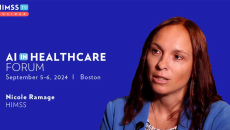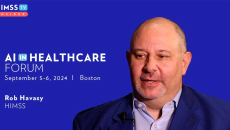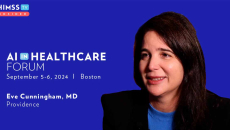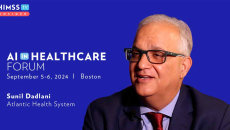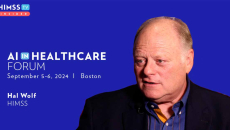clinical AI
HIMSS senior market insights manager Nicole Ramage discusses new research that explores what executive and IT leaders are saying about the challenges and benefits of using artificial intelligence.
Rob Havasy, senior director of the thought advisory group at HIMSS, relays how AI technology is maturing, including people's understanding of the technology and the processes organizations are putting in place to overcome past shortcomings.
Dr. Eve Cunningham, chief of virtual care and digital health at Providence, discusses clinician response to AI, promoting education and engagement within the healthcare workforce and how AI can help providers stay current on patient care.
Sunil Dadlani, EVP and chief information and digital officer at Atlantic Health System, discusses possible unintentional impacts on stakeholders in healthcare with AI implementation and pinpointing priorities to mitigate complications.
At the HIMSS AI in Healthcare Forum in Boston, CEO of HIMSS Hal Wolf highlights the challenges health systems face globally integrating AI, leveraging the technology to ensure beneficial healthcare delivery and regulations pertaining to AI.
David Heaney, CISO at Mass General Brigham, relays best practices for securing AI use in health systems to ensure proper adoption, implementation and cybersecurity - and the types of AI that security specialists use to ward off cyberattacks.
Organizations need to ask how they can secure their use of AI technologies, use AI to secure the organization better and defend against AI-driven attacks, says Dave Heaney, chief information security officer at Mass General Brigham.
Dr Alexander Ryu, vice chair of Innovation and AI at Mayo Clinic, reveals best practices in planning and integrating AI into clinical practice.
QuantHealth cofounder and CEO Orr Inbar discusses how using artificial intelligence for clinical trial simulations can help solve challenges often seen by patients, researchers and the pharmaceutical industry when studying a new drug.
ShiftMed EVP and chief nurse executive Larry Adams discusses artificial intelligence tools such as predictive analytics, intelligent scheduling and data-driven decision support, and how they can help solve staffing shortages in the nursing field.
